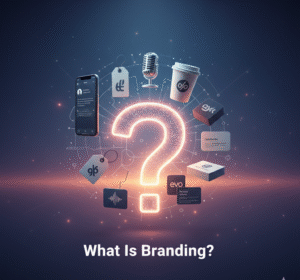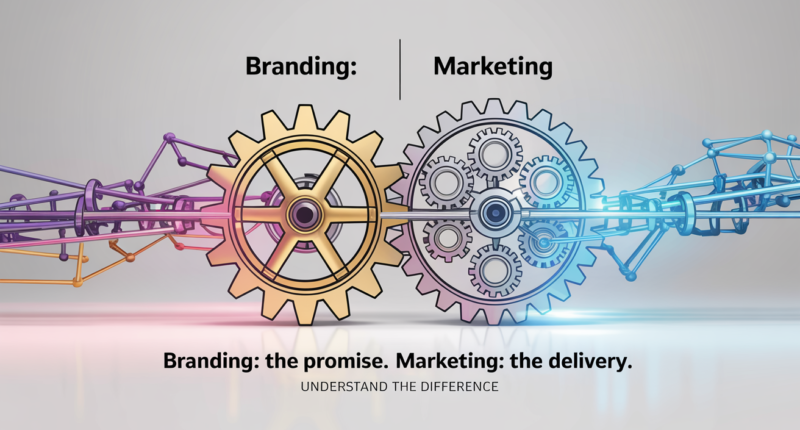Generally, in today’s business world many marketers and business owners use branding and marketing interchangeably. However, branding and marketing are different concepts. Moreover, each plays a distinct role in a company’s success. For example, branding is about building your company’s identity, while marketing is about communicating that identity to customers.
What Is Branding?

For example, branding defines who a company is at its core. In particular, it includes the company’s identity, such as its logo, mission, and core values. Essentially, a brand is the promise you make to customers about what they can expect. Moreover, strong branding builds trust and recognition over time.
What Is Marketing?
On the other hand, marketing is the action that spreads the word about your brand. Specifically, it covers the strategies and tactics you use to reach customers. For example, marketing can include advertising, social media posts, and email campaigns. Ultimately, its goal is to communicate value and drive sales. Additionally, marketing is flexible and often changes quickly with customer trends.
Key Differences between Branding and Marketing
Importantly, for small business owners, understanding the differences between branding and marketing is crucial. For instance, branding tends to be long-term and consistent, while marketing is often campaign-driven and flexible. Moreover, branding focuses on identity and values, whereas marketing focuses on messaging and sales. In short, branding builds trust over time, and marketing aims to get customers interested and engaged right away.
Branding Is Long-Term, Marketing Is Short-Term
First, branding is a long-term investment in your business’s identity. Additionally, consistency matters because it shapes customer perception over time. Meanwhile, marketing is usually short-term and focuses on specific campaigns or sales. For example, a small business brand might stay consistent for years, whereas its marketing messages can change monthly or seasonally.
Branding Builds Relationships, Marketing Drives Action
Importantly, branding builds a relationship with your audience and focuses on the feelings customers have about your company. Additionally, it aims to make your brand memorable and meaningful. On the other hand, marketing focuses on reaching customers and encouraging specific actions, such as making a purchase or signing up. In other words, branding sets the foundation, and marketing leverages that foundation to grow your business.
Branding Builds Trust, Marketing Drives Sales
Finally, branding helps build trust and loyalty over time by creating positive associations with your business. In contrast, marketing often aims for immediate results, such as boosting sales or attracting new leads. Moreover, marketing campaigns can change frequently as goals or trends shift. Ultimately, both branding and marketing work together—strong branding makes marketing more effective and supports sustainable growth.
Why Both Branding and Marketing Matter
So do not choose branding or marketing over the other—use both together. For example, a strong brand identity makes your marketing campaigns more believable. Meanwhile, consistent marketing efforts help spread your brand story to new audiences. In summary, branding and marketing are two sides of the same coin; by using both wisely, small businesses can build loyal customers and grow steadily.









